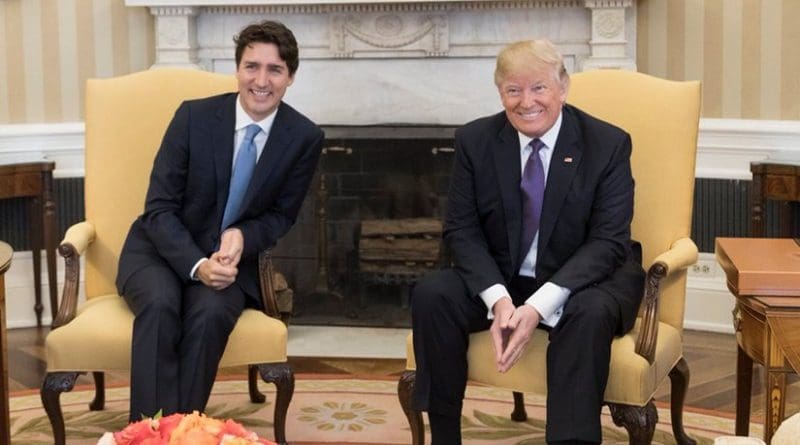New NAFTA Deal Not The Huge Win Trump Claims – OpEd
By Arab News
By Andrew Hammond*
Donald Trump this week celebrated the new North American Free Trade Agreement (NAFTA) deal — to be known as the United States-Mexico-Canada Agreement (USMCA) — as “wonderful” and a “historic transaction.” The breakthrough, coming when Canada cut into an accord agreed by Mexico and the US, buoyed financial markets and may provide a fillip for multilateralism too.
However, while Trump has claimed the renegotiation is a huge political and economic win for his “America first” approach, the final concessions are not as big as he had previously claimed possible, considering he had asserted that “we’re going to make some very big changes or we are going to get rid of NAFTA once and for all.” To be sure, the deal contains multiple wins for the US, including a limited opening of Canada’s dairy markets, but Washington has also agreed to Ottawa’s request to preserve a trade dispute settlement mechanism, while protecting Canada’s auto industry from potential further US tariffs.
Nonetheless, the president will assert that the deal delivers on one of his key 2016 election promises, and he has certainly robustly challenged Mexico City and Ottawa through the process with a frequent war of words, undercutting significant goodwill in the process. Canadian Foreign Minister Chrystia Freeland, for instance, has described the Trump team’s USMCA negotiation approach as, at times, “troubling,” completely unreasonable,” and “unconventional.” Trump has reciprocated by reportedly saying that Freeland “hates America.”
Sunday’s agreement will also give Trump renewed confidence that his agenda can continue to reshape the international political economy. This is especially so after his earlier decisions to withdraw US participation from deals like the Trans-Pacific Partnership; launch new trade sanctions against world powers from the EU to China; and also threaten US withdrawal from the World Trade Organization.
It is certainly true that Trump’s negotiation strategy, of dividing Mexico and Canada, put intense pressure on Ottawa to make a deal after the bilateral agreement between the US and Mexico several weeks ago. He had informed Congress of his intent to sign the bilateral Mexican trade agreement this month if Ottawa did not agree terms by Sunday.
The president tweeted his view that there was “no political necessity to keep Canada in the new NAFTA deal. If we don’t make a fair deal for the US after decades of abuse, Canada will be out.” This posed an acute dilemma for the administration of Prime Minister Justin Trudeau, given that NAFTA underpins three-quarters of the exports Canada sends south of its US border and 2.5 million jobs in the country depend on this trade.
Indeed, had Sunday’s deal not been cut, there was a significant and growing chance the trilateral accord could have collapsed. This was a growing and major concern for financial markets as, since 1994, the North American economy has more than doubled in size, driven to a large degree by expanding trade and investment flows. Trade between the three countries has more than tripled to form a trading bloc with a combined GDP of about $20 trillion.
Politicians and lobby groups had also begun to sound the alarm bells, even in the US, where the NAFTA brand has been most tarnished in recent years. This is because it is estimated that about 14 million US jobs depend on trilateral trade with Canada and Mexico.
Moving forward, the deal now turns to legislative scrutiny, including in the US Congress. The goal for Trump, Trudeau and outgoing Mexican President Enrique Pena Nieto is to sign it before Nieto is replaced on Dec. 1 by populist Andres Manuel Lopez Obrador.
While legislative approval in the US is now significantly more likely than not, hurdles still lie ahead. Knowing this, Trump has tweeted that: “Congress should not interfere with these negotiations.” His message here is largely aimed at congressional Democrats, who may make striking gains in the House of Representatives and/ or the Senate in November’s elections. Democrats are already qualifying their potential support for the new deal. Senator Carl Levin has said that the legislation needs more work, otherwise “few Democrats will vote for it,” while the party’s leader in the Senate, Chuck Schumer, has declared that “any final agreement must be judged on how it benefits and protects the middle class and working people in our country,” leaving the political space open for him to potentially oppose it.
Taken overall, all three leaders can plausibly claim a win after Sunday’s breakthrough. Yet, despite Trump’s assertion that USMCA is a huge success for his approach, his negotiations have done damage to the US’ alliances with Mexico and Canada, and concessions have not been as big as he had previously sought, highlighting the significant continuities the new deal has with NAFTA.
*Andrew Hammond is an Associate at LSE IDEAS at the London School of Economics


North Americsan Union next